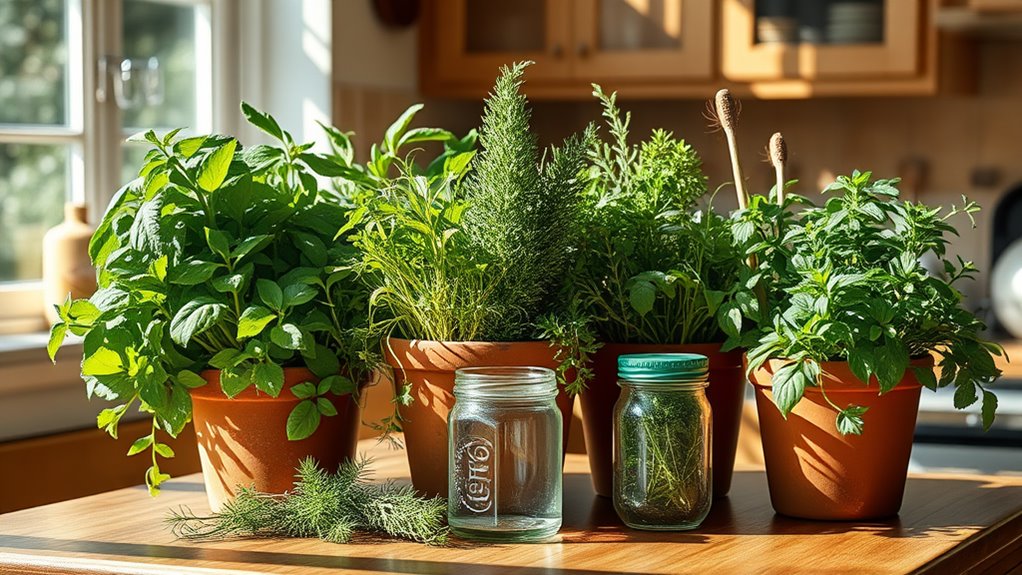7 Herbs Every Beginner Should Know (And Use!)
Key Takeaways
- Basil is versatile and adds a fresh flavor to dishes, making it essential for beginners.
- Parsley is rich in vitamins and easy to grow, perfect as a garnish or flavor enhancer.
- Mint offers a refreshing taste and is great for drinks and desserts, popular among novice cooks.
- Rosemary enhances roasted dishes and baked goods while providing health benefits like improved mood.
- Oregano packs a flavor punch in pasta and grilled meats, making it indispensable in many recipes.
Basil
Basil is one of the most beloved culinary herbs, and for good reason. Its vibrant, aromatic leaves add a fresh, peppery kick to any dish.
As you explore this introductory herbs guide, you’ll discover basil’s versatility in pesto, salads, and sauces.
Whether you grow it yourself or buy it fresh, incorporating basil will elevate your culinary adventures to new heights.
Parsley
Parsley is more than just a garnish; it’s a powerhouse of nutrition packed with vitamins A, C, and K. You can enhance your dishes with its fresh, bright flavor, and its versatility makes it a must-have in your kitchen. Plus, growing parsley at home is surprisingly easy and rewarding, inviting you to enjoy its benefits right at your fingertips. Additionally, parsley is known for its healing properties, providing anti-inflammatory benefits that can support overall health.
Nutritional Benefits of Parsley
While many might think of parsley as just a garnish, it offers a wealth of nutritional benefits that can elevate your health.
This vibrant herb is loaded with vitamins A, C, and K, supporting your immune system and bone health.
It’s also rich in antioxidants, fighting inflammation and protecting your cells.
Incorporating parsley into your diet can truly enhance your wellness journey.
Culinary Uses and Techniques
When it comes to culinary uses, parsley is a versatile superstar in the kitchen.
You can elevate your dishes with its fresh flavor and vibrant color.
Try these techniques:
-
Garnishing: Use chopped parsley to brighten up soups and salads.
-
Flavoring: Incorporate it into sauces and dressings for an extra kick.
-
Infusing: Steep parsley in oils or broths for a delightful aroma.
Growing Parsley at Home
Have you ever dreamed of stepping into your kitchen and snipping fresh parsley just moments before adding it to a dish?
Growing parsley at home is simple! Choose a pot with drainage holes, fill it with nutrient-rich soil, and place it in bright, indirect sunlight.
Water regularly, but don’t drown it. Soon, you’ll harvest a vibrant, fragrant herb that elevates your cooking!
Mint
Mint is one of the easiest herbs to grow and adds a burst of flavor to countless dishes and beverages.
You’ll love incorporating it into your cooking! Here are three delightful ways to use mint:
- Garnish for desserts like chocolate mousse or fruit salads.
- Infuse drinks such as mojitos or iced teas.
- Flavor sauces for lamb or yogurt-based dips.
Enjoy the freshness!
Cilantro
Cilantro, with its bright green leaves and distinctive aroma, elevates a variety of dishes, from fresh salsas to fragrant curries.
You’ll appreciate its vibrant, citrusy flavor that adds depth and freshness to your cooking.
Whether you sprinkle it on top or blend it into sauces, cilantro’s versatility is unmatched, making it an essential herb in your culinary toolkit.
Enjoy experimenting!
Chives
Chives, with their slender green stalks and delicate onion-like flavor, are a must-have herb for enhancing your culinary creations.
They add brightness and freshness to dishes. Here are three delicious ways to use chives:
- Sprinkle chopped chives on baked potatoes for a flavorful topping.
- Stir them into scrambled eggs for an instant upgrade.
- Use them in salads for a delightful crunch.
Rosemary
Rosemary is more than just a fragrant herb; it adds a robust flavor to dishes and elevates your culinary creations to new heights.
Packed with antioxidants and known for its potential health benefits, rosemary can enhance your well-being while tantalizing your taste buds.
Let’s explore how to incorporate this versatile herb into your cooking and daily routine.
Culinary Uses of Rosemary
The distinct, aromatic flavor of rosemary can elevate a variety of dishes, making it a cherished herb in kitchens around the world.
You can embrace its versatility by using rosemary in:
- Roasted meats, enhancing the savory notes of lamb or chicken.
- Flavorful marinades for vegetables, infusing them with depth.
- Savory baked goods, like focaccia, where its scent takes center stage.
Let rosemary transform your cooking!
Health Benefits of Rosemary
Packed with antioxidants and anti-inflammatory compounds, rosemary is more than just a flavorful herb—it’s a powerhouse of health benefits.
This aromatic plant boosts memory, enhances mood, and supports digestion. It may even promote hair growth and improve circulation.
Incorporate rosemary into your diet or enjoy it as an aromatic tea, and you’ll release its remarkable healing properties for a healthier, vibrant life.
Oregano
Although oregano might be small in size, its impact on flavor is anything but insignificant.
You can elevate your cooking with this versatile herb by using it in the following ways:
-
Pasta dishes: Enhance your marinara or pesto for a robust flavor.
-
Grilled meats: Sprinkle it on chicken or lamb for an aromatic kick.
-
Salads: Add fresh oregano to a Greek salad for vibrant taste.

